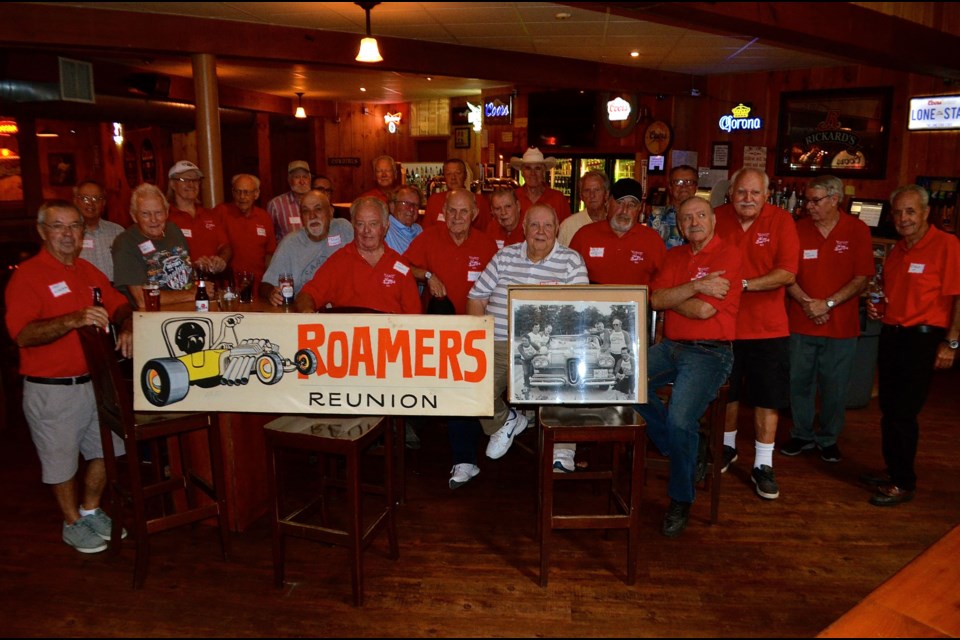In the autumn of 1958, a group of young guys from Guelph with a mutual interest in hot rods decided to start a club. The main objective of the Roamers Car Club was to help each other transform their second-hand, rusted-out jalopies into mean machines.
But they were also building community.
“We had a body shop and what one member couldn’t do another member could,” said founding member Jack Upsdell. “There are a lot of great memories – a few we can’t repeat.”
Hit songs from the time such as Maybelline by Chuck Berry and GTO by Ronny and the Daytonas celebrated car culture and movies such as, 1958’s Thunder Road starring Robert Mitchum as a mechanic who runs moonshine as a side gig, reflected that generations love for fast cars.
“Have you ever seen the show Happy Days, with all the hot rods,” asked founding member Lefty Higgins? “That was real life for us.”
The club operated from 1958 to 1978 but the bonds created during that time have survived to this day.
“The club isn’t functioning anymore,” said Upsdell. “We just get together for the reunion every year. We’ve been doing that for 21 years. During the 20 years the club was in operation we had a transition of about 120 members who have come and gone.”
Many of the members have passed away but their wives stay in touch and come out to the annual reunion.
“There are a number of widows here,” said Upsdell. “I know we have lost two members since the last reunion.”
One of those members was Ken McGladrey, who joined the Roamers in 1960. He and Jacquie, his wife of 51 years were regulars at the reunions and since Ken’s death in October, surviving members and their wives have taken her under their wing.
“It was a big thing to see everybody,” said Jacquie McGladrey. “He loved to get with the members once a year and we would see them around town.”
The Roamers Car Club came from humble beginnings. One might even go as far as to say it was a grassroots movement.
“We started in a farmer’s field on Speedvale Avenue East with 15 members,” said Upsdell. “Our main club for many years was where Harvey’s is today on Gordon Street. What was it a pit with a hoist?”
They limited membership to 30 and there was a strict protocol to joining.
“You had to be sponsored by another member,” said Upsdell. “We would put you on a waiting list and you would have to wait until another member left. When that happened, your name would come up, but it had to be unanimous. If there was one vote against the person, they didn’t get in.”
Membership had its privileges.
“We always had a great rapport with the city police,” said Upsdell. “They helped us organize car rallies. We had dances at the YM-YWCA and Rompin’ Ronnie Hawkins was our main attraction.”
They built cars that could burn rubber and outrun any police cruiser, but they didn’t condone lawlessness.
“We had very strict rules,” said Higgins. “We would fine members if they were squealing their tires. There was a 10-cent fine for swearing. You would have to throw it in the pot.”
More serious offences could get you kicked out of the club or worse.
“There were occasions when one of our members stepped over the line,” said Upsdell. “If they were charged with careless driving or something serious like that the members were harder on him than any judge. Judges in town knew that and sometimes all the charges were dropped.”
The reputation of the Roamers in the community and among local businesses was such that they were considered to be much like the CAA.
“We had the business card,” said founding member Roy Mason. “If someone was stranded on the street, their car broke down or they ran out of gas or whatever we would stop and help. If they didn’t have any money, we would give them our business card.”
The stranded motorist would show the card to the tow truck driver or the garage mechanic to assure them they would get paid for their services.
The Roamers were never a registered charity, but they were always available to help other members, their families and the community at large when they were called upon.
Rust and time have claimed many of the cars The Roamers built during the 20 years the club was in operation. A fitting metaphor, perhaps, for the Roamers themselves as they gather every fall to share stories and reminisce about what they and many others consider a simpler, happier time.
“We were all clean-cut kids back then,” said long-time Roamer, Jack Elsegood. “Hanging out behind the police station and the Armoury. Those were the good old days.”

.png;w=120;h=80;mode=crop)

